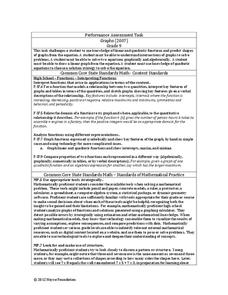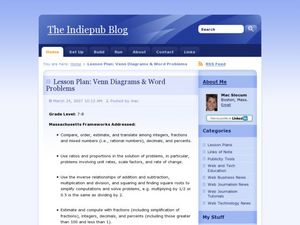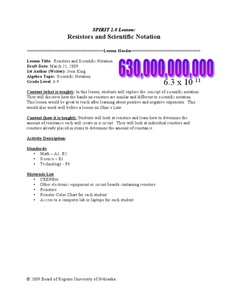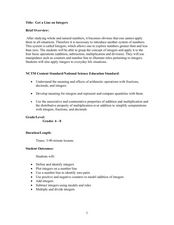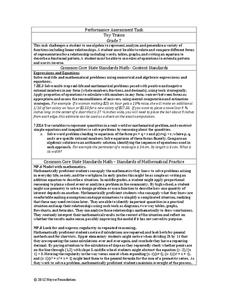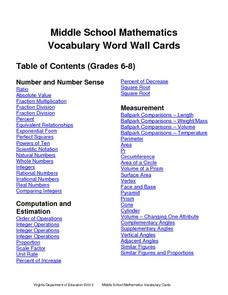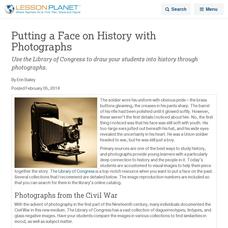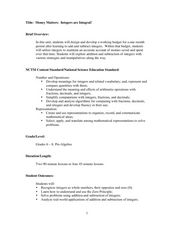Inside Mathematics
Graphs (2007)
Challenge the class to utilize their knowledge of linear and quadratic functions to determine the intersection of the parent quadratic graph and linear proportional graphs. Using the pattern for the solutions, individuals develop a...
Reading Through History
The Federalist Papers: Federalist Paper No. 51
How did Federalists feel about the federal government? Learners search for the answers in the Federalist Paper No. 51, which discusses the powers of the presidency. Then, they answer various questions to test for their comprehension of...
Curated OER
SPIRIT 2.0 Lesosn: Adding and Subtracting Integers
Six pages prepare you to introduce your math stars to the addition and subtraction of positive and negative numbers. They drive a robot back and forth on an actual number line to represent the operations. If you don't have access to a...
Curated OER
Money Circulation: A Story of Trade and Commerce
Students are introduced to the meaning, symbolism, and value of the quarter. They determine the percentage of total monetary value held in quarters and graph the results. Students infer about the U.S. Mint's distrubution of coins. They...
Curated OER
Venn Diagrams & Word Problems
Students explore the concept of Venn Diagrams through word problems. In this Venn Diagram activity, students solve word problems about groups of people using Venn Diagrams. Students use survey results about MySpace and Facebook in a...
Curated OER
Ordering Numbers
Seventh graders compare and contrast positive and negative numbers. They create a T-Chart and list real word examples of positive an negative numbers. After observing an number line and a football field, 7th graders describe the...
Helping with Math
Using Integers
Given nine clues, investigators write down a positive or negative integer that represents the scenario. Then they compare pairs of integers and identify which is less or which is greater according to specified directions. This is a...
Curated OER
Resistors and Scientific Notation
Students explain the importance of scientific notation. In this physics lesson, students determine the resistance of resistors using the colored bands. They compare and contrast scientific notation and resistor band notation.
Curated OER
Unit 1, Worksheet 2, Calculator Worksheet
In this calculator worksheet, students explore place value, standard notation, and exponential notation. They add, subtract, multiply and divide positive and negative integers with and without a calculator. This three-page worksheet...
Curated OER
Integers - Graphical Representation
In this integers of graphical representation worksheet, 7th graders solve 23 various types of problems that include graphing on a number line and writing an integer to represent each statement given. Then they write an equation using...
Curated OER
Get a Line on Integers
Students explore number sense by completing math function problems in class. In this integers lesson, students define integers and practice plotting them on a number line. Students utilize math functions such as addition and...
Curated OER
Additive Inverses
Students investigate properties of additive inverses. In this properties of additive inverses instructional activity, students discuss the what it means for two numbers to be opposites. Students discuss representing opposite numbers...
Curated OER
Star Magnitudes
In this stars worksheet, high schoolers use a chart comparing the absolute and apparent magnitudes for different stars to complete 4 fill in the blank and 2 short answer questions.
Curated OER
Structure of the Atom
Students practice drawing the atomic structure of several different elements. They complete critical thinking questions about atomic structure and compare the atomic mass units for different ions and isotopes of an element.
Curated OER
Adding Integers
Young scholars add integers using a number line. In this algebra lesson, students add one and two digit integers. They compare zero pairs and the addition of integers.
Curated OER
Physical Science Project-Atom
Fifth graders investigate atoms. In this atom instructional activity, 5th graders investigate the parts of an atom. Students explore atom numbers and determine the number of electrons is in each atom.
Noyce Foundation
Toy Trains
Scholars identify and continue the numerical pattern for the number of wheels on a train. Using the established pattern and its inverse, they determine whether a number of wheels is possible. Pupils finish by developing an algebraic...
Curated OER
The Smallest Metric Measurements
In this recognizing metric measurements worksheet, students read groups of three measurements and identify the one that is the smallest. Students solve 15 problems.
Virginia Department of Education
Middle School Mathematics Vocabulary Word Wall Cards
Having a good working knowledge of math vocabulary is so important for learners as they progress through different levels of mathematical learning. Here is 125 pages worth of wonderfully constructed vocabulary and concept review cards....
Curated OER
Putting a Face on History with Photographs
Use the Library of Congress to draw your students into history through photographs.
Mathematics Vision Project
Module 3: Polynomial Functions
An informative module highlights eight polynomial concepts. Learners work with polynomial functions, expressions, and equations through graphing, simplifying, and solving.
Alabama Learning Exchange
Human Slope
Middle and high schoolers explore the concept of slope. In this slope lesson, learners graph lines using a life-size graph. They use chalk on a blacktop to create a coordinate plane and use each other as the tick marks on the grid....
It's About Time
What Determines and Limits an Atom's Mass?
Provide learners with the tools to further understand nuclear energy and isotopes. Young chemists investigate the components of an atom's nucleus, use symbols to represent various isotope forms, and use the percent abundance of an atom's...
National Security Agency
Money Maters: Integers are Integral!
A thoroughly-written lesson plan and a plethora of worksheets about integers comprise this resource. Neophyte number crunchers learn to recognize integers, add and subtract them, and apply the concepts to the designing of a personal...


